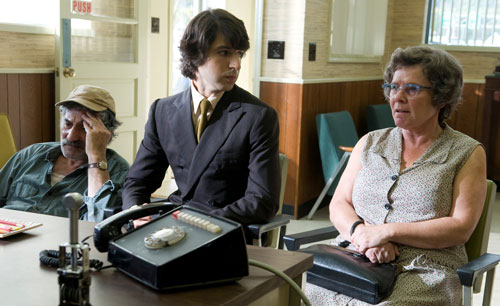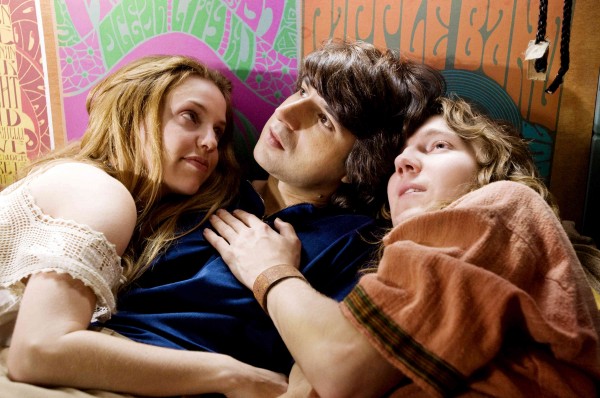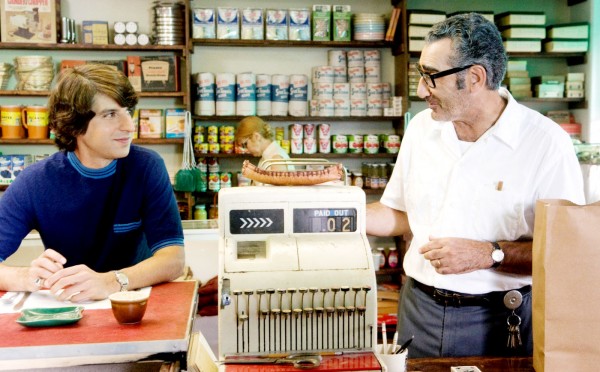Movie Review: Ang Lee's TAKING WOODSTOCK

Taking Woodstock dwells on the seemingly insignificant, and forgets completely about the musical heart and soul. Not that it isn't on purpose, James Schamus' screenplay is based on the book by Elliot Tiber(real name Teichberg), Taking Woodstock: A True Story of a Riot, a Concert, and a Life, in which Elliot never actually watches the concert.
But the audience's awareness and expectations of the event are brushed aside in being "faithful" to the book. In turn, it squanders the rich background(on it's 40th Anniversary no less), thus failing to establish an emotional connection. You find it hard to believe that Oscar winning director Ang Lee(Brokeback Mountain/Crouching Tiger...) wouldn't intervene in some clever way. Alas, you rarely feel truly drawn into what is happening on screen. Taking Woodstock advertises a grilled-cheese sandwich... and serves you toast.
The hazy glow that engulfs the look of the beginning of the film makes it feel more like a warm fairy tale, rather than a comedic look at one of history's most monumental events.
The film revolves around struggling interior designer and painter Elliot Teichberg, played by Demetri Martin, after he moves back home in order to help his parent's failing El Monoco Motel. Elliot plays an inadvertent role in bringing Woodstock to his hometown of Catskills, NY, after the music festival it is driven out of a neighboring town. As president of his town's Chamber of Commerce, and having acquired an "Arts and Festival" permit for a different event he had planned, Elliot contacts Woodstock Ventures in hopes that the festival will help bring people to the Motel. When the land in the back of the motel is deemed unusable, Elliot refers them to the town's dairy farmer Max Yasuger(Eugene Levy), who's 600 acres of grass prove to be the ideal spot for the event.
Newcomer Jonathan Groff is charmingly magnetic as Woodstock producer Michael Lang. His remarkably easy going demeanor is equal only to his "Fonzie" cool. The guy drops in on a helicopter and rides around on a white horse and motorcycle, while the lawyers, investors and land surveyors drive into town in black vehicles and act as if it were an FBI raid. Lang's Jedi like calmness and persuasiveness would have been a nice balance to a stressed out Elliot.
But the situations never seem dire enough. Even when a "high" Elliot incorrectly blurts out that the concert is "free," at a press conference. Elliot is seemingly unfazed at the domino effect this causes long after the drugs wear off.
The film has no real villain. The town locals are as threatening as an 8th grader, literally! And the mobster goons who try to extort "insurance" money are fought off by Elliot's elderly parents in a slapstick farce that will have you laughing but rolling your eyes.
As Elliot, comedian Demitri Martin's plays it pretty straight(no pun intended). Those familiar with the comedian's Comedy Central television show and stand-up, of which I am a huge fan of, will notice his hair and clothes are pretty much what he wears in real life. He adds some comedic nuances in the awkward way he runs. But other than that, there aren't any discernible differences between his character and Martin himself. Lee must have felt his ability to be instantly likeable, was more important than his dramatic talents, as the focus skews away from Elliot's closeted gay status.
As Elliot's Russian immigrant mother Sonia Teichberg, Imelda Staunton isn't given much to work with. She's is left only to play in the key of "over the top", as her character is stubborn, astonishingly greedy, and not much else.
In a surprising and fantastically bizarre turn, Liev Schreiber earns laughs as the towering, cross-dressing, Ex-Marine Vilma, who is brought on as the Motel's security.
While the Moon Landing and other historical events are lightly touched upon on Televisions in the background, split screens are a prevalent tool throughout-- effective at times, extremely annoying during others. The usage is apt only when it showcases true chaos. Like when a play for the locals transforms into an angry nude protest by the local Theater Group, "The Earthlight Players" The group stays free of charge in the Teichberg's barn and are lead by Devon, played well by Tony Award-Winner Dan Fogler(Fanboys/Balls of Fury), but who's speech is the only one that sounded quite modern.
Even though it lacks to capture the heart and soul of Woodstock, it portrays it's massive scope in short but effective glimpses. During an acid trip with a couple in a VW Van(Paul Dano & Kelli Garner), Elliot looks out at the sea of over half a million people. The special FX are breathtaking as it turns into an ocean of waves.
But prior to that scene, they miss an opportunity for a climax that could have utilized Woodstock's infamous soundtrack. Dano and Garner's character's urge Elliot to stay in the van and "listen to our own sounds."
There are a couple of other moments that could have served as a climax. In fact they reach the very cusp of making you feel satisfied with the experience.
Elliot's ride to the concert on the back of a Police motorcycle, through the crowds of people captures moments of beauty and spontaneity. If more of the loose ends were tied up before this scene, it would have been more fun and felt more epic if the film ended there. Perhaps showing him joining the crowd, and leaving you to guess and imagine what Elliot might have done while at the concert.
Like Staunton, the consistently brilliant Emile Hirsch is given broad tools as Elliot's friend Billy, the token Vietnam Vet. character(from what I hear, not in the book). In another moment that could have served as a highpoint, Billy reminisces about a night in his pre-war adolescence that took place on Max's Farm. It almost felt as real and heartbreaking as the scene in Saving Private Ryan-- Matt Damon's story about his brothers right before they shipped out. It would have been a tear jerker and the flat out climax of the movie, had they gone the route they took with Sean Astin's speech at the end of Two Towers-- where they intercut scenes of the other characters' developing situations. There was an open man in the N Zone, and they didn't throw 'em the ball!
Taking Woodstock is light hearted comedy that often misses the comedic mark. The worthwhile moments are few and far between. The weakest comedic moment takes place during a conversation between Max and Elliot about money gouging, "Can you believe that? A dollar, for water." Ba dum dum! C'mon. It's a period piece, not Back to The Future.
If you want to experience Woodstock the event, watch one of the documentaries. There are plenty of good ones out there. If you still want to experience Taking Woodstock, experience it when it comes out on DVD.